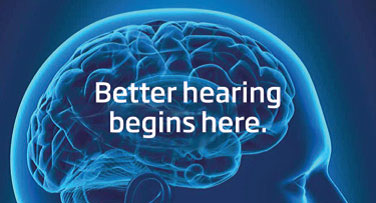If you think hearing happens all in the ears, that’s not right! Yes, we do hear with our ears, but analyse the auditory signals and we understand the words using our brain. Hearing happens between our ears, in the hearing part of our brain. That’s where sounds becomes meaningful.
When we listen to a conversation, our ears and brain work together as a system, and it’s our brain that does the main job. When we listen to a conversation, it is our brains that orient, recognise, focus, and separate the auditory information received by our ears.
“Our brain uses the information from our two ears to localise the signals and tell us where the sound is coming from. Inside our brain, acoustic signals are recognised and categorised in terms of relevance /importance. This way our brain helps us separate out unwanted noises and sounds and focus in on a conversation,” says Dr Moh Dadafarin, principal audiologist at Ear and Hearing Australia.
If our brain is not getting the right sounds to work with (due to hearing loss), it takes intense effort to create meaning. When the sound signals from our ears are compromised, our brain must work even harder to fill in the gaps. This extra effort can take its toll. In fact, studies have shown that, over time, hearing loss can lead to isolation and depression. That’s why it’s important that our brain, not just our ears, receives the support it needs.
If you have a hearing loss and require a hearing aid, you may consider hearing devices from BrainHearing technology. These devices are designed for your brain, supporting the hard work it does. They provide a better awareness of the sound environment to help your brain with each of these tasks:
- Orient according to position of sounds, using both ears
- Separate sound sources
- Focus on what’s important
- Recognise what each sound is and make sense of it
Brain Hearing instruments deliver sound with the clearest, purest signal possible – in the way your brain is best able to understand it. In addition, because BrainHearing technology preserves the important details in speech, your brain doesn’t have to strain to fill in the gaps. This technology supports your brain, so you’re able to hear better, with less effort, allowing you to participate more actively in life.
To experience this technology and to learn more about Brain Hearing, contact Ear & Hearing Australia.
The good news is that there are many different options available to people who experience hearing loss. Ear & Hearing Australia can bring your hearing back to life!
Ear & Hearing Australia employs only university-trained audiologists, so you can be assured you’re being cared for by the very best in the field. They have no affiliation with specific hearing aid manufacturers, which means they offer impartial advice on the best hearing aids for your specific needs. They are committed to providing the most professional and the best level of premium care in the field.
Ear and Hearing Australia Services:
- Diagnostic hearing assessments
- Supply & fitting of hearing aids
- Hearing rehabilitation services
- Premium Lyric provider
- Tinnitus treatment & management
- Micro-suction ear wax removal
Speak to us at the Melbourne Seniors & Disability Expo on Friday and Saturday, 22 -23 November, at the Melbourne Exhibition Centre, or for more information or to book an appointment, visit https://earandhearing.com.au/ or call 1300761 667.
